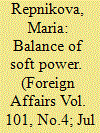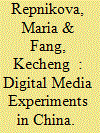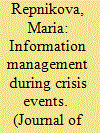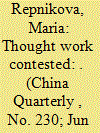|
|
|
Sort Order |
|
|
|
Items / Page
|
|
|
|
|
|
|
| Srl | Item |
| 1 |
ID:
160839


|
|
|
|
|
| Summary/Abstract |
In the reform era, management of information by the Chinese Communist Party has been continuously moving away from explicit, crude tactics of the past toward more subtle and orderly mechanisms of the present. This study examines one facet of this transformation in the online sphere: digital persuasion. Drawing on three emerging trends in online persuasion, including official digital revamping of state media, expansion of government Weibo, and official promotion of patriotic bloggers, the authors explain how online persuasion is taking on an increasingly participatory form under President Xi. Specifically, the conceptualization of ‘authoritarian participatory persuasion 2.0’ includes direct co-production of persuasion, with netizens called to repost, share and create content, as well as the indirect participation, whereby netizens are invited to partake in the life of the top leader, Xi Jinping, and to consume exclusive practical tips provided by the state. The participatory digital persuasion, whereas intended to facilitate public complicity with the regime, has also opened up spaces for satire and ‘incivility’ unmasking and challenging the state’s covert propaganda practices.
|
|
|
|
|
|
|
|
|
|
|
|
|
|
|
|
| 2 |
ID:
186919


|
|
|
| 3 |
ID:
168174


|
|
|
|
|
| Summary/Abstract |
With the rapid decline of traditional media in China, the party-state faces the growing challenge of shaping public opinion online. This article engages with one response to this challenge – a state-sanctioned digital media experiment aimed at creating a new form of journalism that appeals to the public and helps to disseminate Party propaganda. We analyse the emergence of a national success story, Shanghai-based model media outlet Pengpai, and its diffusion across different regions. We argue that the synergy between local officials and media entrepreneurs has propelled Pengpai’s national fame. We further demonstrate that while there has been a cross-national attempt to diffuse this model, it has produced mixed results owing to a number of factors, including the superficial commitment of local officials and media professionals. These findings demonstrate that state-sanctioned decentralized experimentation can deliver unpredictable results in the sphere of media policy, and they further question the capacity of the party-state to effectively reinvent public persuasion in the digital age.
|
|
|
|
|
|
|
|
|
|
|
|
|
|
|
|
| 4 |
ID:
154823


|
|
|
|
|
| Summary/Abstract |
This article examines the evolving process of China’s information management at sub-national level through the prism of a crisis event. Specifically, it investigates the response of officials and the media to Beijing’s fatal floods of 2012—the heaviest and the deadliest floods the Chinese capital has seen in 60 years. The article draws on ethnographic observations, the analysis of interviews with Chinese media professionals, officials and media scholars, as well as the coverage of the storm by two prominent, but distinct Beijing news outlets: an official daily, Beijing Ribao and a commercial daily, Jinghua Shibao. The analysis reveals various strategies deployed by Beijing authorities to positively shape public opinion, and the media’s creative implementation of official directives. Namely, the two newspapers fused regular news coverage with different styles of positive framing. This process of mutual and diverse adaption highlights the increasingly dynamic nature of China’s crisis communication and public opinion management.
|
|
|
|
|
|
|
|
|
|
|
|
|
|
|
|
| 5 |
ID:
185619


|
|
|
|
|
| Summary/Abstract |
This article examines China's most controversial soft power export – the Confucius Institute initiative – through the case study of its promotion and implementation in Ethiopia. As one of China's closest partners in Africa, Ethiopia presents a path-breaking case for examining the potential and the limitations of Confucius Institutes. In contrast to the existing literature that depicts Confucius Institutes largely as contested and limited initiatives, this article shows that Confucius Institutes and Confucius Classrooms have thus far been relatively successful in Ethiopia. Specifically, China's fusion of practical or tangible benefits with language and cultural promotion – what I describe as “pragmatic enticement” – invokes support from key participants in this project, including university administrators, students and Chinese teachers. In the long term, however, even in the highly favourable context of Ethiopia, the sustainability of Confucius Institutes is questionable, as there are apparent gaps between the rising expectations of Ethiopian administrators and students, and the limited resources on the ground.
|
|
|
|
|
|
|
|
|
|
|
|
|
|
|
|
| 6 |
ID:
153350


|
|
|
|
|
| Summary/Abstract |
This article examines the dynamic evolution of China's ideology work through the prism of journalism education. Official sensitivity about both student activism and the media makes journalism education a critical sector for observing how the Party attempts to instil ideology. The article interrogates the process of negotiation of official ideology among authorities, educators and students at elite journalism schools. It demonstrates that alongside state-sanctioned media commercialization and globalization, official influence still looms large in journalism training. Ideological teachings continue to occupy a core place in the curricula, and the authorities deploy a mix of structural oversight, ad hoc surveillance and coercion to keep the educators in check. The effects of the official ideology work, however, are ambivalent, as educators and students engage in the active reinterpretation of the Party's media principles. While these practices do not directly undermine the Party's legitimacy, they demonstrate that official ideology has merely constructed what Yurchak terms a “hegemony of form,” highlighting a degree of vulnerability in China's mode of adaptive authoritarianism.
|
|
|
|
|
|
|
|
|
|
|
|
|
|
|
|
|
|
|
|
|